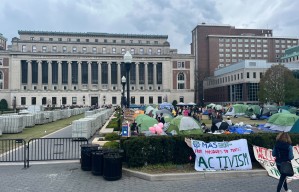Appearing Thursday night on MSNBC's "Hardball With Chris Matthews," Democratic National Committee Chairwoman Rep. Debbie Wasserman Schultz of Florida repeatedly failed to explain the difference between a Democrat and a socialist.
Host Chris Matthews first asked Schultz if she supports giving self-described democratic socialist and Vermont Sen. Bernie Sanders a prime-time speaking spot at the Democratic National Convention should he fail to receive the party's nomination for president.
Schultz dodged the question and eventually conceded that Sanders should receive a slot, considering the amount of enthusiasm he has generated from the party's base.
Matthews then threw the hardball, asking Schultz, "What is the difference between a Democrat and a socialist?"
Schultz shrugged it off with a chuckle, and Matthews continued: "I used to think there was a big difference, but what do you think it is? Between a Democrat like Hillary Clinton and a socialist like Bernie Sanders."
Schultz skirted the question, replying, "The more important question is - what's the difference between being a Democrat and being a Republican?"
So Matthews pressed even harder: "What's the big difference between a Democrat and a socialist? You're the chairman of the Democratic Party - tell me the difference between you and a socialist."
Again, Schultz was unable to answer the question and tried to steer the conversation in a different direction. "The relevant debate that we'll be having over the course of this campaign is what's the difference between being a Democrat and being a Republican."
Matthews concluded: "I think there's a big difference. I think there's a huge difference."
Socialism is defined in the Merriam-Webster dictionary as "any of various economic and political theories advocating collective or governmental ownership and administration of the means of production and distribution of goods."
Sanders is an independent senator who has caucused with the Democrats in the Senate and describes his ideology as being democratic socialist rather than simply socialist. However, Sanders himself is loose with that terminology, the New Republic noted.
Sanders described his ideology in a 2006 interview with Democracy Now!:
"I think [democratic socialism] means the government has got to play a very important role in making sure that as a right of citizenship all of our people have health care; that as a right, all of our kids, regardless of income, have quality childcare, are able to go to college without going deeply into debt; that it means we do not allow large corporations and moneyed interests to destroy our environment; that we create a government in which it is not dominated by big money interest. I mean, to me, it means democracy, frankly. That's all it means."
More recently, Sanders praised the "long social-democratic tradition" of Nordic countries, pointing to Finland's system in particular as being worthy of modeling after.
"Finland is a country which provides high-quality health care to all of its people with virtually no out-of-pocket expense; where parents and their young children receive free excellent childcare and/or parental leave benefits which dwarf what our nation provides; where college and graduate education is free to students and where children in the public school system often record the highest results in international tests," he said. "In Finland, where 80 percent of workers belong to unions, all employees enjoy at least 30 days paid vacation and the gap between the rich and poor is far more equitable than in the United States."








